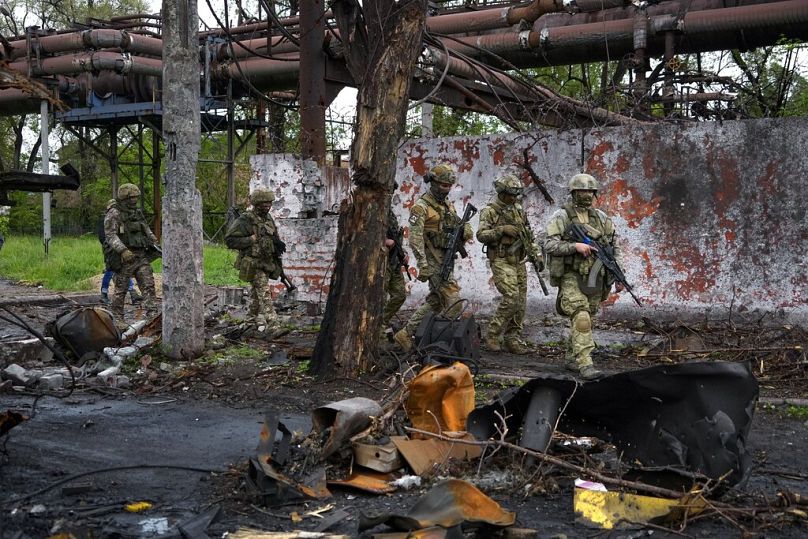Many thought it would be over in just days. A quick offensive, a government on the run, and victory declared. Instead, Russia’s invasion of Ukraine has lasted three months and counting, and with no end in sight.
The war was expected to be over in a couple of days, according to most analysts: a quick offensive, a government on the run, and victory declared.
 ADVERTISEMENT
ADVERTISEMENT
 ADVERTISEMENT
ADVERTISEMENT
Instead, Russia’s invasion of Ukraine has lasted three months and counting.
In that time, tens of thousands have died, including many Russian soldiers and officers, millions have fled their homes, and major Ukrainian cities have been reduced to shadows of their former selves.
Three months in, few are any wiser about how it will all end.
"Unfortunately, the conflict is likely to be there for many years to come, although the intensity of fighting might go down when Russia feels they have achieved enough to proclaim some kind of victory at home,” Mats Engström, a visiting fellow at the European Council on Foreign Relations (ECFR), told Euronews.
A war with no end
Very early on, Russia's offensive got bogged down on the outskirts of Kyiv. A month in, Russia ended up pulling back its forces from around Kyiv to focus on the industrial region of the Donbas, which Moscow-backed separatists and Ukraine have been fighting over since 2014.
Russia has indeed managed to seize significant chunks of territory around the Crimean Peninsula, and secured full control over the key port of Mariupol last week after a months-long siege, effectively cutting Ukraine off from the Sea of Azov.
Yet Russia has so far lacked a clear result that would allow the Kremlin to claim victory or take control of large parts of Ukraine and establish a puppet government.
Some see a Russian military unsure of the next steps.
“The Russian leadership is urging the military command to show at least some gains, and it has nothing else to do but to keep sending more troops into the carnage,” said Mykola Sunhurovskyi, a military expert at the Kyiv-based Razumkov Centre think-tank.
The Kremlin appears to still harbour a more ambitious goal of cutting off Ukraine from the Black Sea coast all the way to the Romanian border, a move that would also give Moscow a land corridor to Moldova’s separatist region of Transnistria, where Russian troops are stationed.
But Russia seems to know that this objective is not currently achievable with the limited forces it has.
“I think they’re just increasingly realising that they can’t necessarily do all of it, certainly not at one go,” said Justin Crump, a former British tank commander who heads Sibylline, a strategic advisory firm.
Instead, Moscow’s losses have forced it to rely increasingly on hastily patched-together units in the Donbas that could only make small gains, he said. “It’s a constant downshifting of gear toward smaller objectives that Russia can actually achieve."
Two senior Russian officials appeared to acknowledge this week that the advance has been slower than expected.
Secretary of Russia’s Security Council Nikolai Patrushev said it “is not chasing deadlines,” and Defence Minister Sergei Shoigu said the pace was deliberate to allow civilians to flee, even though forces have repeatedly hit civilian targets.
Many in Ukraine and the West thought Putin would pour resources into the Donbas to score a decisive triumph by Victory Day on 9 May, when Moscow celebrates its defeat of Nazi Germany in World War II. Russia has falsely called the war a campaign to “denazify” Ukraine -- a country with a democratically elected Jewish president who wants closer ties with the West.
Rather than a massive campaign, however, the Kremlin opted for tactical mini-offensives, aimed at steadily trying to encircle Ukrainian forces.
An uncertain future
Fighting continues to be fierce in the Donbas region. Yet elsewhere much of the rest of the country is trying to return to some semblance of normal.
Ukrainian President Volodymyr Zelenskyy has remained in Kyiv and defiant, while Western arms continue to flood into the country, meaning that the war could stretch on for months or even years.
ECFR's Mats Engström says that it’s hard to know where the war will go from here.
“There is certainly a possibility of some kind of coup against Putin given how bad the war is going, leading to a Russian withdrawal. On the other hand, the threat of nuclear weapons use is already on the table. Although unlikely, it cannot be ruled out,” he said.
Ultimately, no one knows what will happen, or whether we will be back in this same spot in three months, or even three years' time.











